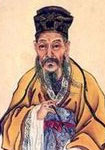《蜂》梅尧臣 翻译、赏析和诗意
《蜂》是宋代梅尧臣创作的一首诗词。以下是诗词的中文译文、诗意和赏析:
春风无主撩乱时,
当春风吹拂花朵时,蜜蜂们在无主的状态下忙碌疯狂,
The spring breeze stirs up chaos without a master,
分群养子各守脾。
它们分成群体,养育子嗣各自守卫着自己的巢穴。
They divide into groups, nurturing offspring and guarding their own hives.
争掇花腴为蜡蜜,
它们竞相采集花蜜,准备制作蜂蜡和蜜糖,
They compete to collect nectar from flowers, preparing to produce beeswax and honey,
年年共割不我稽。
但每年主人都会割取蜜蜂的产物,它们却无法反抗。
Every year, the owner harvests their products, and they cannot resist.
俄逢主人若过虑,
突然遇到了主人的过度谨慎,
Suddenly encountering the owner's excessive caution,
畏尔有虿成噬脐。
害怕你们会成为害虫来咬伤主人。
Afraid that you would become pests and harm the owner.
密将恶物毒尔族,
主人为了保护自己,将毒物密藏起来,威胁蜜蜂们,
In order to protect himself, the owner hides poisonous substances, threatening the bees,
尔曾不得同醯鸡。
你们从来没有品尝过与鸡肉一起的甜酒。
You have never tasted the sweet wine together with chicken.
王虽尔名尔何补,
尽管你们是蜂王,但你们如何得到补偿呢?
Even though you are the queen bee, how do you benefit from it?
造甘为利乃自取。
制造甘甜的蜜糖是为了给主人带来利益,这是你们自己选择的。
Creating the sweet honey is for the owner's benefit, and it is your own choice.
这首诗词《蜂》展现了蜜蜂的生存状态和与主人的关系。蜜蜂们在春风的驱使下,忙碌采集花蜜,但却无法保留自己的产物,被主人剥夺了权益。诗人通过描述蜜蜂与主人的互动,揭示了生活中的不公与权力的困扰。蜜蜂们勤劳工作,却无法获得应有的回报,只能默默承受主人的支配和掠夺。整首诗词以蜜蜂为象征,抒发了作者对社会现实的思考和对个体命运的关切。
《蜂》梅尧臣 拼音读音参考
fēng
蜂
chūn fēng wú zhǔ liáo luàn shí, fēn qún yǎng zǐ gè shǒu pí.
春风无主撩乱时,分群养子各守脾。
zhēng duō huā yú wèi là mì, nián nián gòng gē bù wǒ jī.
争掇花腴为蜡蜜,年年共割不我稽。
é féng zhǔ rén ruò guò lǜ, wèi ěr yǒu chài chéng shì qí.
俄逢主人若过虑,畏尔有虿成噬脐。
mì jiāng è wù dú ěr zú, ěr céng bù dé tóng xī jī.
密将恶物毒尔族,尔曾不得同醯鸡。
wáng suī ěr míng ěr hé bǔ, zào gān wèi lì nǎi zì qǔ.
王虽尔名尔何补,造甘为利乃自取。
“王虽尔名尔何补”平仄韵脚
拼音:wáng suī ěr míng ěr hé bǔ
平仄:平平仄平仄平仄
韵脚:(仄韵) 上声七麌
